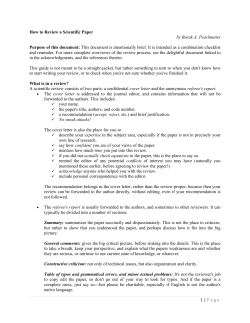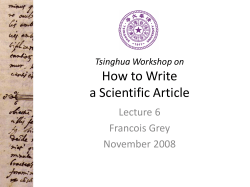
Document 228381
2013/11/12 How to Respond to Reviewer and Editor Comments Dr. Steve Wallace Outline Reviewers and editors decide the fate of our paper. Managing the relationship with them is vital to successful publication. What are reviewers really saying? How can we respond to them? What do we do when reviewers don't agree? How important is the editor in the decisiondecision-making process? 1 2013/11/12 Academic writers use the competitive, political, and supportive energy of other researchers Supportive energy: energy: Writing support groups, journal clubs, review groups. groups. Competitive energy: energy: Researchers compare themselves with other researchers and keep score. score. Political:: Researchers are political. Political The negative side is that half of peer reviewed articles in top rated journals are never referenced by anyone, including the author. This shows that low impact papers are often published in the best journals because the articles are reviewed by friends of the author (Holub, Tappeiner, and Eberharter, SEJ 1991). Practice: Don’t Criticize References I think that the author knows his subject better than I do. I usually use his references to find a suitable reviewer - Associate Editor, Journal of Retailing Avoid emphasizing emphasizing the importance of your paper by putting down on other papers. Your references are probably your reviewers and they are sensitive. 2 2013/11/12 Your Research Area is Small It is very likely that either your reference or one of his friends will be your reviewer. Rejected for “Poor English” English” Cite Researchers Who Like You Include references to authors who like your papers. They might become referees. Include references to people whom you met at conferences. This is to get a fair chance. Referees have to make an effort to be fair to unknown authors. 3 2013/11/12 Meet 100 Active Researchers There are about a hundred people in your research field who are likely to be referees of your papers. Prepare a list of one hundred active people in your main research area. Try to meet them within a fivefive-year period. Present papers at (or at least attend) attend) two professional meetings a year. When presenting papers or attending regional, national, or international meetings, try to get to know these people. This is your best opportunity for networking. When you go to conferences,, smile and “work the room.” conferences room.” Examples of Offensive Citation: "The deficiency of Smith's approach is..." “The problems with Smith’ Smith’s paper are…" “A serious weakness with Smith’ Smith’s argument, however, is that ......” “The key problem with Smith’ Smith’s explanation is that ......” “It seems that Smith’ Smith’s understanding of the X framework is questionable.” 4 2013/11/12 A better citation would be: “Smith Smith’’s model was effective in the X problem, however in the Y…” “The X benefit of Smith’ Smith’s approach is not applicable to Y…” Practice: Pay Attention to Reviewer Comments “I don’t’ think you treated Smith fairly in your literature review. His insights deserve more respect.” “You forgot to include Smith as a reference in you paper. His work is fundamental to understanding your research.” 5 2013/11/12 Complement Potential Reviewers Important references should be mentioned on the first page. The editor usually chooses reviewers from those mentioned in the introduction and references. Be generous to all authors, and explain why their research is important for your analysis. This uses less than 1% of the space, but significantly affects the probability of acceptance. acceptance. Scan Journal for Related Articles Try to find some related articles in the journal to which you wish to submit your paper. Authors who published a paper on a related subject are likely to be referees. The editor still remembers them and has a connection to them. You need to cite their papers.. papers Even if they are slightly related, try to use their references. Explain how your work is related. 6 2013/11/12 Suggesting Reviewers Suggest Researchers whose hypotheses and ideas your work supports Researchers whose work yours builds on International collaborators in the same field Don’t suggest Researchers working closely on the same research question Researchers whose work is refuted by your study Researchers whose ideas run counter to your own or to the findings in your manuscript Williams HC. How to reply to referees’ comments when submitting manuscripts for publication. J Am Acad Dermatol, 2004; 51:79–83 Suggesting Reviewers (continued) Compared to editor-selected reviewers, author-suggested reviewers may be more likely to recommend acceptance Nominating nonreviewers may increase the odds of publication success even more than that of nominating reviewers Wager E, Parkin EC, Tamber PS. Are reviewers suggested by authors as good as those chosen by editors? Results of a rater-blinded, retrospective study. BMC Med 2006; 4:13 Goldsmith LA, Blalock EN, Bobkova H, et al. Picking your peers. J Invest Dermatol ,2006; 126:1429– 1430 7 2013/11/12 Practice: Incorporate English Editing into Your Supply Chain Use professional editorial assistance Particularly if you are not a native English speaker Editors will not publish papers with grammatical errors Referees are often biased; they have an excuse to recommend rejection because of grammatical errors Reasons for Major Revision or Rejection of Taiwanese Journal Papers Faulty methodology Inadequate references 7% 7% 4% Poor quality supporting figures 9% 16% Outside the scope of journal Not enough contribution to field 7% 2% Authors did not follow manuscript instructions Poor writing style and use of English Title not representative of study 8% English Errors 27% 13% Subject of little novel interest or not generally applicable 8 2013/11/12 Everyone Gets Criticized The peer-review process means that almost all authors receive criticism. Reviewers’ comments were deemed valuable by 76% (176 of 231 authors) of authors whose manuscripts were eventually accepted and 60% (21 of 35 authors) of authors whose manuscripts were rejected or withdrawn. Ernst E. A beginner’s guide to criticism. Med J Aust 2007;187:649 Green R, Del Mar C. The fate of papers rejected by Australian Family Physician. Aust Fam Physician 2006; 35:655–656 Authors Use Comments in Revision A study on rejected manuscripts showed that 82% of authors used at least one change suggested by the reviewers from the original journal. Even though most of these rejected manuscripts were later published in lower-impact, secondchoice journals, some manuscripts incorporating at least one of the changes suggested by the reviewers of the first journal were published in higher-impact, second choice journals. Armstrong AW, Idriss SZ, Kimball AB, et al. Fate of manuscripts declined by the Journal of the American Academy of Dermatology. J Am Acad Dermatol, 2008; 58:632–635 9 2013/11/12 Revision as Practice “After finishing a journal paper I don’ don’t immediately submit it to a journal. It is not finished yet. I always find small errors in text, notations, explanations, or missing references in my finished paper. I’ I’m especially careful when rereading the introduction and abstract before submission. A small error on the first page of the introduction or abstract indicates I was careless. Errors here make referees and editors conclude that the paper should be rejected. They conclude that the author is likely to be careless in content as well as English. And they might be right.” right.”- Educational Psychology Associate Professor #12 Revision (continued) “If you don‘ don‘t proofread your own introduction, why expect the referees to spot and correct all the errors?” errors?”- Chinese History Professor # 2 “You should always check spelling before submission. But there are no substitutes for reading the papers personally. Spell Spell checkers do not check word meanings.” meanings.” – Electrical Engineering Post Doctoral Researcher # 102 10 2013/11/12 Revision from Reviewer Comments – The time limit for resubmission is usually six months to a year from the date of the invitation letter. – This is your last chance to revise the paper. You a have 50% chance. – Poor revisions will surely result in rejection. – If you lose your chance to submit, you may wait three more years. Go the extra mile. Be well-prepared, complete, polite, and use evidence not emotion – Take every comment seriously. – First, thank the reviewer. – Number all comments and respond. – Indicate that you are doing everything possible. – If you cannot follow the demands, thank the referee for the suggestion, explain why they are beyond the scope of the paper or why it is not possible at the time. Williams HC. How to reply to referees’ comments when submitting manuscripts for publication. J Am Acad Dermatol, 2004; 51:79–83 11 2013/11/12 Do Not Attack Referees Generally, it is not a good idea to attack the reviewers. – Do not say: "The referee's idea is bad, but mine is good." – Better to say, “the referee has an interesting idea, but the proposed idea is also good, particularly because of this or that fact.” – If the referee makes a good point (you can almost always find conditions under which the referee's points are good), explain why you are not pursuing that strategy in the paper. When answering peer review comments: Differentiate comments and responses in the letter file using different font styles Identify major revisions in the text made in response to peer review comments with highlighting, underlining, and strikethrough fonts or as requested by the editor 12 2013/11/12 Revising Your Article Based on Reviewer Comments Start with small changes Biggest mistake authors make is planning to respond too much Don’t get overwhelmed— overwhelmed—do a little every day Revising Citations Most reviewers reports do this. Don’t read all of the articles and books recommended unless the reviewer says you’re doing the same research or the citation contradicts you Add a brief sentence about each citation, not a paragraph Reviewers can be helpful in pointing out recent studies and avoiding embarrassing mistakes 13 2013/11/12 Revising Terms and Definitions Use previous research to defend your definition of the term or revise it Revising to Shorten Editorial comment: What can you cut? Unnecessary words, block quotes, footnotes, long summaries of other research, additional cases If possible divide into two articles 14 2013/11/12 Revising to Lengthen Common contradiction between editors and reviewers Can be used as an excuse not to revise unless the editor agrees May need to ask the editor for more space Revising Theoretical and Methodological Approaches May be better to move to a new journal 15 2013/11/12 Do You Have to Do Everything the Reviewers Ask? No, but you must answer every comment with a detailed defense. Types of Defense You Can Use in Your Revision Cover Letter Dates: Reviewer 1 has disputed my dating Dates: of_______. I stand by my dating, but have added a footnote explaining how I arrived at the dates and I have provided some additional sources. Analysis:: Reviewer 2 disagrees with my list of Analysis causes for______. Although I think my list is correct, there is a debate in the literature on the causes, so I have added a reference to that debate in the text. 16 2013/11/12 Argument: Reviewer 1 seems to have misread Argument: the premise of my article, which was______. I thought it was clear, but I have taken the opportunity to clarify this point. Data:: although the comments of Reviewer 1 on Data the relevance of my argument about_____ was interesting, I could not add material on that topic because I must adhere to the word limit. Data: I thought the second reviewer’s comment regarding the relevance of_____ was brilliant, but after several attempts, I could not integrate it into the text in a brief enough space. Instead, I have inserted a general note. Cases: because the reviewers were in conflict on the treatment of the second case ( one recommended that I say more about it and the other recommended that I cut it), I have chosen to follow the second reviewer and cut that section. 17 2013/11/12 Title: I did not modify the title as one reviewer Title: recommended, because I think it better suggests the argument, but I have added more specific key words so it will more accurately show up on online searches. Citation:: the second reviewer recommended that I Citation address________, but there wasn’t enough space for it, so I just added an end note referencing that reading. Term: one reviewer thought my use of the Term: word_____ was unusual, but I have found it used in this way more than a dozen times in academic texts in the field; so, I have chosen to keep it. I can provide you with those citations if you wish. Additional:: once I started revising in response to Additional the peer reviewers’ helpful comments, I saw some other problems and revised several sections so that they were tighter and more to the point. I also changed my text in the second section from___ to____, since it supports my point better. 18 2013/11/12 Cover Letter Separate your response from your cover letter to disguise your name. Conclusion www.editing.tw www.seminars.tw 華樂絲學術英文編修 How to Write and Submit an Academic Paper in 18 Weeks 19
© Copyright 2025




















